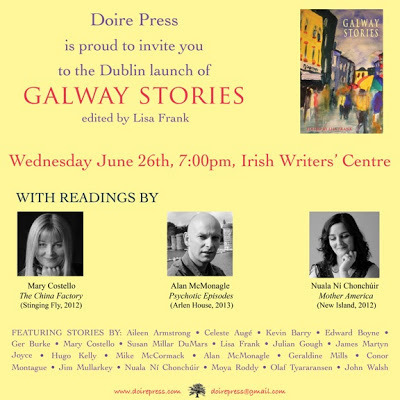Nuala Ní Chonchúir's Blog, page 53
June 11, 2013
DAVE LORDAN GUEST EDITS PENDULINE
 Dave Lordan, as guest editor of Penduline, features, as you might guess, a lot of performance/spoken word poets.
Dave Lordan, as guest editor of Penduline, features, as you might guess, a lot of performance/spoken word poets.He also put the following question to seven writers, including myself: Which Irish writer, alive or dead, do you think is most unjustly unread? Why should we read them now? Our answers - mine on the wonderful Síofra O'Donovan - are here in a piece called 'Ireland Unread'.
Dave's editorial interview is also worth a read. He says, 'It isn’t really a good time to be anything in Ireland except a crooked politician, banker or businessman or one of their arselickers. It’s the time of the wolf in Ireland. And this is true in the arts as well as everything else. You need to be very thick-skinned, very determined, perhaps even a little bit vicious, as well as very talented, to be able to stick at professional arts practice in Ireland now if you are coming from outside the establishment. '
On James Joyce:
'Dubliners is the Ur-text of the last century of Irish melancholy naturalism, which is our default/dominant expressive mode in long and short fiction; Dubliners has been rewritten dozens and dozens of times and is being rewritten all over Ireland right now no doubt and often by people who have never read it. They don’t have to read it to have been influenced by it since its influence is so general.'
More about Joyce from me, come the weekend :)
Published on June 11, 2013 03:19
June 10, 2013
WRITING AND THE BODY - ABEI PLENARY TEXT & A REVIEW
I went to Natal in Brazil last August to deliver a plenary lecture and read from my fiction and poetry at an Irish Studies Conference, run by ABEI. The paper I gave concerned writing about the body and it has been published in the ABEI Journal - The Brazilian Journal of Irish Studies. It's here and starts at page 71.
There is also a thoughtful review of Mother America by Viviane Carvalho da Annunciação on page 143. Thanks once again to Laura Izarra, and all the crew in Brazil, for having me over. I look forward to returning sometime and seeing more of beautiful Brazil.
There is also a thoughtful review of Mother America by Viviane Carvalho da Annunciação on page 143. Thanks once again to Laura Izarra, and all the crew in Brazil, for having me over. I look forward to returning sometime and seeing more of beautiful Brazil.
Published on June 10, 2013 00:00
June 9, 2013
IRISH INDEPENDENT REVIEW OF TOWN & COUNTRY
Writer, and publisher at Dedalus, Pat Boran reviewed Town and Country, the Faber anthology of New Irish Stories, in yesterday's Irish Independent. He called it 'a compelling if fragmented picture of where we are now.' I will paste in the full text below as these links have a habit of disappearing:
Exploration of our changing landscape is, in short, compelling 08 June 2013, Pat Boran, Irish Independent
Few anthologies of new writing can be read as simply a 'gathering of flowers', as the original Greek might suggest. In Ireland, perhaps more than elsewhere, a new collection of stories is expected to be more than the sum of its parts, and must somehow describe the present state of the nation and perhaps of Irishness itself.
If editor Kevin Barry's introduction is a somewhat perfunctory one from a writer who can usually be relied upon to engage, his claim for a genre "pulsing with great, mad and rude new energies" is for the most part borne out by this selection of well known and emerging names.
Leopold Bloom's assertion that "A nation is the same people living in the same place" is sent up by Ned Hynes ("If that's so I'm a nation for I'm living in the same place for the past five years"). The notion is challenged here too, if not entirely exploded, and Town & Country features stories set in Germany, Barcelona and an unnamed island in the North Sea, among other locations, with one of the most moving and troubling, by Desmond Hogan, having its emotional heart in the post-conflict Balkans.
Even so, geography is a good place to start, and location, properly explored, has often been relied upon to produce story. Thus Town & Country, perhaps fittingly, opens in rural Ireland, with Dermot Healy's typically dialogue-spare and suggestive piece about a photographer visiting (revisiting?) ruins and abandoned houses in the West. Though the historical view is longer, it is difficult not to see here some echo of the more recent ruins and derelict buildings of the Irish landscape.
One of the reasons why Ireland may be a natural home to the short story again is that our society has undergone such change in recent times. And change, whether above or just below the surface, is what the story is best equipped to explore.
The most able writers know how to zoom in on and frame those ongoing changes in precisely observed moments. Mike McCormack's ‘A Winter Harmonic’ brings together a lorry crash and the discovery of medical files, among other things, to tell the story of "how lives in a small village hold together", while Nuala Ní Chonchúir, in a story that has a hint of Roald Dahl about it, shows how the move for his wife into a nursing home (with the creepy title Emerald Sunsets) is one change too many for her doting husband.
Julian Gough's hyper-inventive tale of an exiled Irishman's efforts to create a pop song "as addictive as cocaine" is both extended riff and compelling fable and adds one of the few truly playful notes to a mostly serious if not grim or grey volume.
Contemporary Ireland is, variously, a country "where the young have the run of the place" (Colin Barret in the powerful ‘The Clancy Kid’) or where Celtic Tiger cocktails come in "oversized glasses filled a third of the way" (Eimear Ryan in ‘The Recital’).
But it is also a place where so many relationships are under strain and old models no longer trusted. Michael Harding, in an affecting story of a man coming to terms with illness, sees an unbridgeable gap between past and present in a country where "the church is now so disgraced that all the buildings will probably be Omniplex cinemas by the time I'm 75".
Making no prediction about the future, the stories in Town & Countryinstead offer a compelling if fragmented picture of where we are now.
Exploration of our changing landscape is, in short, compelling 08 June 2013, Pat Boran, Irish Independent
Few anthologies of new writing can be read as simply a 'gathering of flowers', as the original Greek might suggest. In Ireland, perhaps more than elsewhere, a new collection of stories is expected to be more than the sum of its parts, and must somehow describe the present state of the nation and perhaps of Irishness itself.
If editor Kevin Barry's introduction is a somewhat perfunctory one from a writer who can usually be relied upon to engage, his claim for a genre "pulsing with great, mad and rude new energies" is for the most part borne out by this selection of well known and emerging names.
Leopold Bloom's assertion that "A nation is the same people living in the same place" is sent up by Ned Hynes ("If that's so I'm a nation for I'm living in the same place for the past five years"). The notion is challenged here too, if not entirely exploded, and Town & Country features stories set in Germany, Barcelona and an unnamed island in the North Sea, among other locations, with one of the most moving and troubling, by Desmond Hogan, having its emotional heart in the post-conflict Balkans.
Even so, geography is a good place to start, and location, properly explored, has often been relied upon to produce story. Thus Town & Country, perhaps fittingly, opens in rural Ireland, with Dermot Healy's typically dialogue-spare and suggestive piece about a photographer visiting (revisiting?) ruins and abandoned houses in the West. Though the historical view is longer, it is difficult not to see here some echo of the more recent ruins and derelict buildings of the Irish landscape.
One of the reasons why Ireland may be a natural home to the short story again is that our society has undergone such change in recent times. And change, whether above or just below the surface, is what the story is best equipped to explore.
The most able writers know how to zoom in on and frame those ongoing changes in precisely observed moments. Mike McCormack's ‘A Winter Harmonic’ brings together a lorry crash and the discovery of medical files, among other things, to tell the story of "how lives in a small village hold together", while Nuala Ní Chonchúir, in a story that has a hint of Roald Dahl about it, shows how the move for his wife into a nursing home (with the creepy title Emerald Sunsets) is one change too many for her doting husband.
Julian Gough's hyper-inventive tale of an exiled Irishman's efforts to create a pop song "as addictive as cocaine" is both extended riff and compelling fable and adds one of the few truly playful notes to a mostly serious if not grim or grey volume.
Contemporary Ireland is, variously, a country "where the young have the run of the place" (Colin Barret in the powerful ‘The Clancy Kid’) or where Celtic Tiger cocktails come in "oversized glasses filled a third of the way" (Eimear Ryan in ‘The Recital’).
But it is also a place where so many relationships are under strain and old models no longer trusted. Michael Harding, in an affecting story of a man coming to terms with illness, sees an unbridgeable gap between past and present in a country where "the church is now so disgraced that all the buildings will probably be Omniplex cinemas by the time I'm 75".
Making no prediction about the future, the stories in Town & Countryinstead offer a compelling if fragmented picture of where we are now.
Published on June 09, 2013 11:48
June 8, 2013
TOWN & COUNTRY - FABER REVIEWS
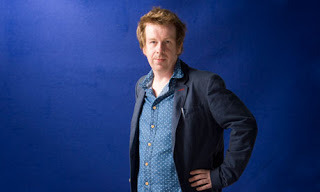 Editor of Town & Country: IMPAC winner Kevin Barry (pic: Guardian)The Faber anthology was published this week and with Kevin Barry's risen star (augmented by his IMPAC win) the reviews are tumbling in. They are a mixed bag, it would have to be said, with reviewers differing entirely on which stories work and don't, and how the book fares as a whole.
Editor of Town & Country: IMPAC winner Kevin Barry (pic: Guardian)The Faber anthology was published this week and with Kevin Barry's risen star (augmented by his IMPAC win) the reviews are tumbling in. They are a mixed bag, it would have to be said, with reviewers differing entirely on which stories work and don't, and how the book fares as a whole. When you have a story in an anthology like this, naturally you are interested to see if reviewers notice or care about your story. My story 'Joyride to Jupiter' got a bit of a thrashing from Valerie Riordan at BookMunch: 'Nuala Ní Chonchúir’s ‘Joyride To Jupiter’ covers the sadness and horror of a partner lost to dementia, and, though it’s decently written, it’s a fairly predictable story, up to and including the ending (no spoilers!); the hints about child abuse are a clever addition, adding ambiguity to the reader’s relationship with the narrator, but I’m not sure, still, that this elevates the story to the level I’d like to see in an anthology like this one.' Ouch
But the Scotsmanreview, by Tom Adair, felt differently: 'Thankfully, other stories soar without much effort. “Joyride to Jupiter”, perfectly pitched, a tender love story by the gifted Nuala Ni Chonchuir, is the pre-eminent example, telling its tale of a couple’s cruel disintegration, held somehow together by selfless love, producing an ending that is excruciatingly moving.' Tom - I am tracking you down to hug you and shove of a copy of my forthcoming Scotland-set novel into your paw :)
Giles Newington reviews the book in The Irish Times today and he finds it a 'sharp, lively and varied selection', while noting the absent writers and singling out, among others, newcomers Colin Barrett and Lisa McInerney for praise.
It's an exciting business having a story in such a prominent anthology and, personally, I think it's a great one - I was gobsmacked by several stories, including Éilís Ní Dhuibhne's and Keith Ridgway's. And it's equally exciting (and nerve-wracking) reading the reviews. Bring 'em on!
Published on June 08, 2013 00:45
June 7, 2013
99 WORD STORY BY TONIGHT

Can you write a 99 word story by midnight tonight? If so Big Smoke Writing Factory want your words:
Entering "The 99" - Guidelines
Entrants must be available to read at the Flash Bulbs event in Dublin on the evening of Saturday June 22nd 2013 Submissions should be flash fiction of exactly 99 words. No more. No less. (Title is not included in wordcount.) Up to three entries per writerEntry is free Send all entries to bigsmokeflash@gmail.com Please include "Competition Entry" as the subject of your email Work should be submitted as an attachment (.rtf, .doc or .docx) Author's name or personal information must not appear on the attached document Entries must be the original work of the author Entries will be judged by guest judge Dave Lordan The judge's decision is final A short-list of the top entries will be invited to read their pieces at Flash Bulbs and the winner will be announced on the night Winner will receive a €250 Big Smoke Writing Factory gift voucherEntries close at midnight GMT on Friday June 7th 2013
Published on June 07, 2013 03:41
June 6, 2013
HOT PRESS REVIEWS FABER ANTHOLOGY

Thanks to the ever vigilant John Foyle for posting this pic on Twitter of Olaf Tyaransen's mini-review of Town and Country, the new Faber anthology of Irish Short Stories. Click if you can't read the text.
Published on June 06, 2013 05:33
GALWAY STORIES LAUNCH - DUBLIN
Published on June 06, 2013 00:00
June 5, 2013
SPAIN PICS - mostly Cáceres
We had a great time at the AEDEI conference in Cáceres in Spain, which took 'Voice and Discourse in the Irish Context' as its theme: there were papers on language, literature, linguistics, music, etc. I gave a plenary on the second-preson voice in my novel YOU and in Edna O'Brien's A Pagan Place.
The sun shone, wine and tapas were consumed, the old city of Cáceres was explored - a stunning, secret gem. We even went to Madrid for a couple of days and got to the Dalí exhibition at the Reina Sofia.
It's very hard to write a report after the fact but here are some pics to give a flavour of the trip. Big thanks to Carolina Amador of the Uni of Extramdura for inviting me over and for treating us so well. Now to get rid of the cheese/bread/wine belly accumulated over eight days. Sigh.
 Juno & Finn chilling - Finn reading, as per
Juno & Finn chilling - Finn reading, as per
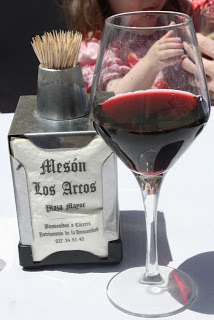 €2.50 for a glass of superior wine on Plaza Mayor, Cáceres. Score :)
€2.50 for a glass of superior wine on Plaza Mayor, Cáceres. Score :)
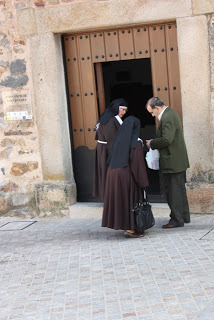 What's in the bag, Sister?
What's in the bag, Sister?
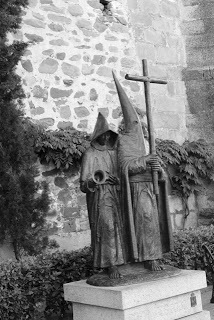 Statue wearing the nazareno (penitential robe)
Statue wearing the nazareno (penitential robe)
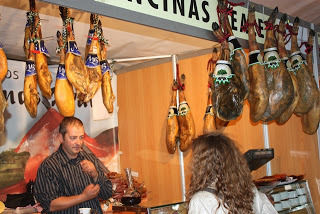 They sold and served cured meat everywhere
They sold and served cured meat everywhere
 Tripping down from the old town to the new
Tripping down from the old town to the new
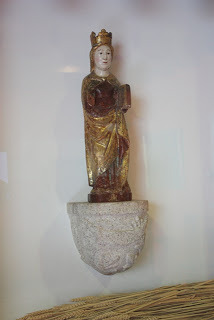 Statue with wheat
Statue with wheat
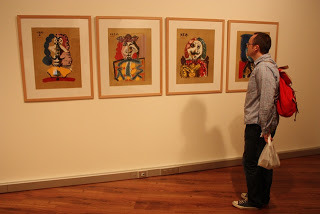 Finbar checking out the Picasso lithographs in the old town's gallery
Finbar checking out the Picasso lithographs in the old town's gallery
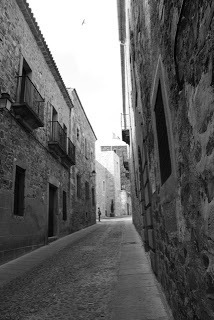 The old town was often deserted
The old town was often deserted
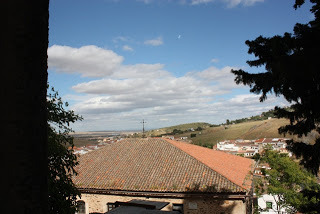 View from the old town over the plain at Cáceres
View from the old town over the plain at Cáceres
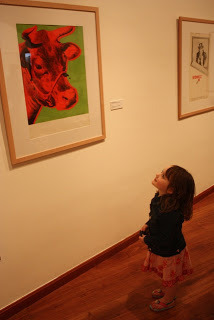 Juno looking at Warhol ;)
Juno looking at Warhol ;)
 The gateway of the star
The gateway of the star
 Me and Marisol Morales Ladrón of AEDEI and Alcalá Uni
Me and Marisol Morales Ladrón of AEDEI and Alcalá Uni
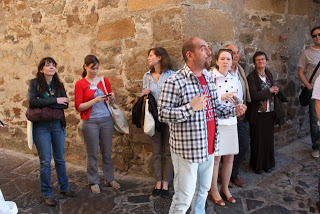 Some of the academics with our old town tour guide, who was VG
Some of the academics with our old town tour guide, who was VG
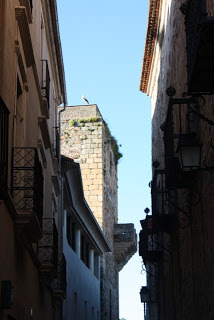 A stork on a rooftop (?)
A stork on a rooftop (?)
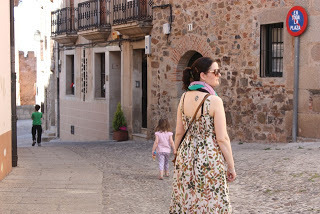 Finn, Juno, Nuala exploring Cáceres
Finn, Juno, Nuala exploring Cáceres
 Clara-Maeve (Carolina Amador's daughter) and Juno hit it off
Clara-Maeve (Carolina Amador's daughter) and Juno hit it off
 Irish Ambassador Justin Harman joined us for a reception at the art gallery
Irish Ambassador Justin Harman joined us for a reception at the art gallery
 Anne Fogarty of Mary Immaculate College entertained us with her Limerick
Anne Fogarty of Mary Immaculate College entertained us with her Limerick
usages and, most of all, the Rubberbandits song 'Horse Outside'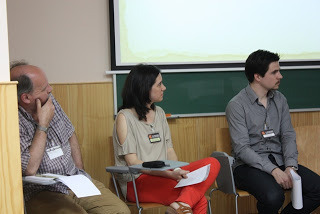 Some of the panel on the fascinating Voice of the Irish Immigrant: Kevin McCafferty, Carolina Amador and Persijn de Rijke
Some of the panel on the fascinating Voice of the Irish Immigrant: Kevin McCafferty, Carolina Amador and Persijn de Rijke
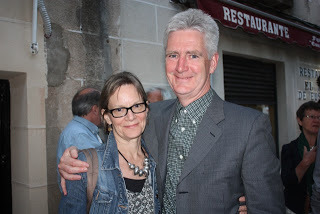 Christine and Martin Dowling, musicians and lovely people from Chicago/Belfast
Christine and Martin Dowling, musicians and lovely people from Chicago/Belfast
 Christine and Martin Dowling playing at Restaurante El Figón de Eustaqio
Christine and Martin Dowling playing at Restaurante El Figón de Eustaqio
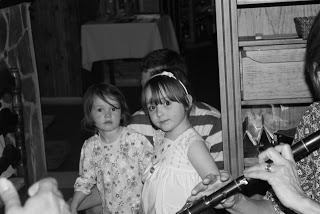 Clara-Maeve and Juno listen to the music
Clara-Maeve and Juno listen to the music
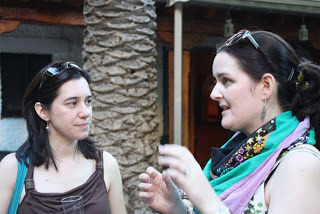 Carolina and myself yapping at a bar called El Corral de las Ciguinas - they had cocktails, mmmm.
Carolina and myself yapping at a bar called El Corral de las Ciguinas - they had cocktails, mmmm.
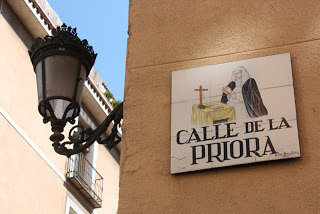 Madrid street sign
Madrid street sign
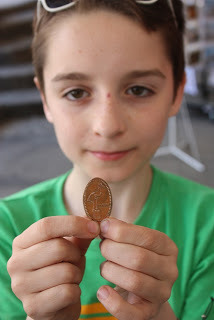 Finn with a flattened coin
Finn with a flattened coin
 Dalí!
Dalí!
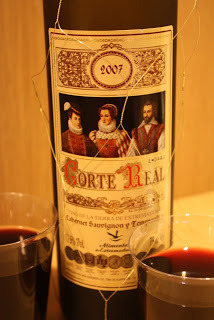 Wine bought in Cácares, supped in Madrid.
Wine bought in Cácares, supped in Madrid.
The sun shone, wine and tapas were consumed, the old city of Cáceres was explored - a stunning, secret gem. We even went to Madrid for a couple of days and got to the Dalí exhibition at the Reina Sofia.
It's very hard to write a report after the fact but here are some pics to give a flavour of the trip. Big thanks to Carolina Amador of the Uni of Extramdura for inviting me over and for treating us so well. Now to get rid of the cheese/bread/wine belly accumulated over eight days. Sigh.
 Juno & Finn chilling - Finn reading, as per
Juno & Finn chilling - Finn reading, as per
 €2.50 for a glass of superior wine on Plaza Mayor, Cáceres. Score :)
€2.50 for a glass of superior wine on Plaza Mayor, Cáceres. Score :)
 What's in the bag, Sister?
What's in the bag, Sister?
 Statue wearing the nazareno (penitential robe)
Statue wearing the nazareno (penitential robe)
 They sold and served cured meat everywhere
They sold and served cured meat everywhere
 Tripping down from the old town to the new
Tripping down from the old town to the new
 Statue with wheat
Statue with wheat
 Finbar checking out the Picasso lithographs in the old town's gallery
Finbar checking out the Picasso lithographs in the old town's gallery
 The old town was often deserted
The old town was often deserted
 View from the old town over the plain at Cáceres
View from the old town over the plain at Cáceres
 Juno looking at Warhol ;)
Juno looking at Warhol ;)
 The gateway of the star
The gateway of the star
 Me and Marisol Morales Ladrón of AEDEI and Alcalá Uni
Me and Marisol Morales Ladrón of AEDEI and Alcalá Uni
 Some of the academics with our old town tour guide, who was VG
Some of the academics with our old town tour guide, who was VG A stork on a rooftop (?)
A stork on a rooftop (?)
 Finn, Juno, Nuala exploring Cáceres
Finn, Juno, Nuala exploring Cáceres
 Clara-Maeve (Carolina Amador's daughter) and Juno hit it off
Clara-Maeve (Carolina Amador's daughter) and Juno hit it off
 Irish Ambassador Justin Harman joined us for a reception at the art gallery
Irish Ambassador Justin Harman joined us for a reception at the art gallery
 Anne Fogarty of Mary Immaculate College entertained us with her Limerick
Anne Fogarty of Mary Immaculate College entertained us with her Limerickusages and, most of all, the Rubberbandits song 'Horse Outside'
 Some of the panel on the fascinating Voice of the Irish Immigrant: Kevin McCafferty, Carolina Amador and Persijn de Rijke
Some of the panel on the fascinating Voice of the Irish Immigrant: Kevin McCafferty, Carolina Amador and Persijn de Rijke
 Christine and Martin Dowling, musicians and lovely people from Chicago/Belfast
Christine and Martin Dowling, musicians and lovely people from Chicago/Belfast
 Christine and Martin Dowling playing at Restaurante El Figón de Eustaqio
Christine and Martin Dowling playing at Restaurante El Figón de Eustaqio
 Clara-Maeve and Juno listen to the music
Clara-Maeve and Juno listen to the music
 Carolina and myself yapping at a bar called El Corral de las Ciguinas - they had cocktails, mmmm.
Carolina and myself yapping at a bar called El Corral de las Ciguinas - they had cocktails, mmmm.
 Madrid street sign
Madrid street sign
 Finn with a flattened coin
Finn with a flattened coin
 Dalí!
Dalí!
 Wine bought in Cácares, supped in Madrid.
Wine bought in Cácares, supped in Madrid.
Published on June 05, 2013 07:21
June 4, 2013
'Good Writing vs Talented Writing'
Back from Spain, exhausted, my mind full of new ideas and insights about language and literature, so generously offered at the AEDEI conference in Cáceres.
Despite tiredness, I had a long convo with my husband this evening about adequate vs brilliant writers, writerly 'career' trajectories, PR opps and luck etc.. I then found this article 'Good Writing vs Talented Writing' by Maria Popova, on the ever brilliant Brain Pickings site. It says all I wanted to say but didn't articulate.
I get fed up reading hyped books that fall far short. Spare me from the ordinary, mundane prose of so many writers and the overblown PR that goes along with them.
In the article Popova talks about the book About Writing: Seven Essays, Four Letters, and Five Interviews by author and literary critic Samuel Delany in which he synthesizes his most valuable insights from thirty-five years of teaching creative writing.
This quote I love:
'The talented writer often uses rhetorically interesting, musical, or lyrical phrases that are briefer than the pedestrian way of saying “the same thing.” The talented writer can explode, as with a verbal microscope, some fleeting sensation or action, tease out insights, and describe subsensations that we all recognize, even if we have rarely considered them before; that is, he or she describes them at greater length and tells more about them than other writers.'
Also:
'Either in content or in style, in subject matter or in rhetorical approach, fiction that is too much like other fiction is bad by definition.'
And:
'Good writing is clear. Talented writing is energetic. Good writing avoids errors. Talented writing makes things happen in the reader’s mind — vividly, forcefully — that good writing, which stops with clarity and logic, doesn’t.
Why is so much ordinary fiction taken as being good? Why are many so-so books given acres of attention in the media etc.? Why do agents and publishers, both, seem to love the mediocre and mundane? It all baffles me, I have to say.
Despite tiredness, I had a long convo with my husband this evening about adequate vs brilliant writers, writerly 'career' trajectories, PR opps and luck etc.. I then found this article 'Good Writing vs Talented Writing' by Maria Popova, on the ever brilliant Brain Pickings site. It says all I wanted to say but didn't articulate.
I get fed up reading hyped books that fall far short. Spare me from the ordinary, mundane prose of so many writers and the overblown PR that goes along with them.
In the article Popova talks about the book About Writing: Seven Essays, Four Letters, and Five Interviews by author and literary critic Samuel Delany in which he synthesizes his most valuable insights from thirty-five years of teaching creative writing.
This quote I love:
'The talented writer often uses rhetorically interesting, musical, or lyrical phrases that are briefer than the pedestrian way of saying “the same thing.” The talented writer can explode, as with a verbal microscope, some fleeting sensation or action, tease out insights, and describe subsensations that we all recognize, even if we have rarely considered them before; that is, he or she describes them at greater length and tells more about them than other writers.'
Also:
'Either in content or in style, in subject matter or in rhetorical approach, fiction that is too much like other fiction is bad by definition.'
And:
'Good writing is clear. Talented writing is energetic. Good writing avoids errors. Talented writing makes things happen in the reader’s mind — vividly, forcefully — that good writing, which stops with clarity and logic, doesn’t.
Why is so much ordinary fiction taken as being good? Why are many so-so books given acres of attention in the media etc.? Why do agents and publishers, both, seem to love the mediocre and mundane? It all baffles me, I have to say.
Published on June 04, 2013 12:25
May 31, 2013
STINGING FLY SUBS OPEN TODAY!
I am at an Irish Studies Conference in beautiful Cácares in Spain at the mo but wanted to let you know that today is the day you can start subbing your stories for The Stinging Fly issue I am editing (Spring 2014). See below for all the details from Fly HQ. I cannot WAIT to read your work!!
Note: Stories for the special flash fiction showcase are only being accepted on one day: 22nd June, which is International Flash Fiction Day.
Note on June 2013 submissions from The Stinging Fly:
Submissions received during June will be read for our Spring 2014 issue.
Nuala Ní Chonchúir is the guest fiction editor for this issue. Read our announcement and what Nuala is looking for here.
As part of her guest editorship Nuala will include a flash fiction showcase. Submissions for the showcase (stories up to 500 words, only one story to be submitted per writer) will be accepted by e-mail only and on one day only: Saturday June 22nd, which is international flash fiction day. We will give further instructions on how to make your submission closer to the time.
All other submissions — poetry, short stories — must be submitted by post in the usual way, following the guidelines below. Please read them.
Writers may submit a story for the flash fiction showcase and submit a second longer story by post.
— — — —We publish new, previously unpublished work by Irish and international writers. We have a particular interest in promoting the short story. Each issue also includes a mix of poetry, book reviews and essays, alongside occasional author interviews and novel extracts. We welcome submissions of poetry and prose in translation.
Work submitted should ideally not be under consideration elsewhere.
During 2013 The Stinging Fly will accept submissions in February, June and October. We will effectively, from now on, be working two issues in advance. Submissions received in February 2013 will be considered for our October issue (Winter 2013–14); June 2013 submissions will be read for our Spring 2014 issue; October 2013 submissions will be read for our Summer 2014 issue.
The postal address for submissions is: The Stinging Fly, PO Box 6016, Dublin 1, Ireland. We do not accept e-mail submissions.
Each submission should include an e-mail address for reply.
All submissions should be accompanied by a cover letter, which should include:
* Author’s Name * E-mail address and postal address
* Date of Submission * Name of story/poems submitted
* Brief biographical note, if you wish.
Anyone submitting fiction and poetry should include a separate cover letter with each. All fiction submissions should be printed using 1.5 or double line spacing. Minimum font size: 11pt. Print on one side of the page only. Every piece of work should have the author’s name printed or signed on it.
* No more than one story and/or four poems should be submitted during any one submission period.
* Short stories and poems should always be just as long (or as short) as they need to be. (In our Winter 2012-13 issue the longest story is over 5,000 words; the shortest has less than 600.)
* All submissions are read. The editors’ decision may not be correct but it is final. Allow up to three months (from the end of month in which you submit) for a response to your submission - we will try to respond to everyone (yes or no) within that time.
* With a limited budget, we are only in a position to offer contributors a discretionary token payment. They also receive two copies of the issue in which their work is featured and can order further copies at a discounted rate.
* Copyright remains in all cases with the author. Some work published in the magazine may also be included on our website.
Our Featured Poets
In each issue we publish a number of poems by a poet who is working towards a first collection. In 2013 we will only accept submissions for the Featured Poet slot during the February submission period. To be considered, please send us 6-10 previously unpublished poems. If we want to see more, we will get back to you. If submittng for this slot, do not make a separate poetry submission.
Comhchealg
Is í ‘Comhchealg’ cuid Ghaeilge The Stinging Fly. Cuirtear fáilte roimh phíosaí Gaeilge ó scríbhneoirí úra. Is nós linn aistriúcháin Bhéarla a chur ar fáil i gcás na ndánta a roghnaítear. Chuige sin, déanaimid filí Béarla a chur ag obair ar shaothar a gcomhúdar. Leantar na treoirlínte iarratais thuas a bhaineann le filíocht Bhéarla.
Contact Details
The Stinging Fly
PO Box 6016
Dublin 1
Ireland
stingingfly AT gmail dot com
Note: Stories for the special flash fiction showcase are only being accepted on one day: 22nd June, which is International Flash Fiction Day.
Note on June 2013 submissions from The Stinging Fly:
Submissions received during June will be read for our Spring 2014 issue.
Nuala Ní Chonchúir is the guest fiction editor for this issue. Read our announcement and what Nuala is looking for here.
As part of her guest editorship Nuala will include a flash fiction showcase. Submissions for the showcase (stories up to 500 words, only one story to be submitted per writer) will be accepted by e-mail only and on one day only: Saturday June 22nd, which is international flash fiction day. We will give further instructions on how to make your submission closer to the time.
All other submissions — poetry, short stories — must be submitted by post in the usual way, following the guidelines below. Please read them.
Writers may submit a story for the flash fiction showcase and submit a second longer story by post.
— — — —We publish new, previously unpublished work by Irish and international writers. We have a particular interest in promoting the short story. Each issue also includes a mix of poetry, book reviews and essays, alongside occasional author interviews and novel extracts. We welcome submissions of poetry and prose in translation.
Work submitted should ideally not be under consideration elsewhere.
During 2013 The Stinging Fly will accept submissions in February, June and October. We will effectively, from now on, be working two issues in advance. Submissions received in February 2013 will be considered for our October issue (Winter 2013–14); June 2013 submissions will be read for our Spring 2014 issue; October 2013 submissions will be read for our Summer 2014 issue.
The postal address for submissions is: The Stinging Fly, PO Box 6016, Dublin 1, Ireland. We do not accept e-mail submissions.
Each submission should include an e-mail address for reply.
All submissions should be accompanied by a cover letter, which should include:
* Author’s Name * E-mail address and postal address
* Date of Submission * Name of story/poems submitted
* Brief biographical note, if you wish.
Anyone submitting fiction and poetry should include a separate cover letter with each. All fiction submissions should be printed using 1.5 or double line spacing. Minimum font size: 11pt. Print on one side of the page only. Every piece of work should have the author’s name printed or signed on it.
* No more than one story and/or four poems should be submitted during any one submission period.
* Short stories and poems should always be just as long (or as short) as they need to be. (In our Winter 2012-13 issue the longest story is over 5,000 words; the shortest has less than 600.)
* All submissions are read. The editors’ decision may not be correct but it is final. Allow up to three months (from the end of month in which you submit) for a response to your submission - we will try to respond to everyone (yes or no) within that time.
* With a limited budget, we are only in a position to offer contributors a discretionary token payment. They also receive two copies of the issue in which their work is featured and can order further copies at a discounted rate.
* Copyright remains in all cases with the author. Some work published in the magazine may also be included on our website.
Our Featured Poets
In each issue we publish a number of poems by a poet who is working towards a first collection. In 2013 we will only accept submissions for the Featured Poet slot during the February submission period. To be considered, please send us 6-10 previously unpublished poems. If we want to see more, we will get back to you. If submittng for this slot, do not make a separate poetry submission.
Comhchealg
Is í ‘Comhchealg’ cuid Ghaeilge The Stinging Fly. Cuirtear fáilte roimh phíosaí Gaeilge ó scríbhneoirí úra. Is nós linn aistriúcháin Bhéarla a chur ar fáil i gcás na ndánta a roghnaítear. Chuige sin, déanaimid filí Béarla a chur ag obair ar shaothar a gcomhúdar. Leantar na treoirlínte iarratais thuas a bhaineann le filíocht Bhéarla.
Contact Details
The Stinging Fly
PO Box 6016
Dublin 1
Ireland
stingingfly AT gmail dot com
Published on May 31, 2013 23:00
Nuala Ní Chonchúir's Blog
- Nuala Ní Chonchúir's profile
- 41 followers
Nuala Ní Chonchúir isn't a Goodreads Author
(yet),
but they
do have a blog,
so here are some recent posts imported from
their feed.


